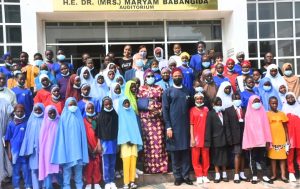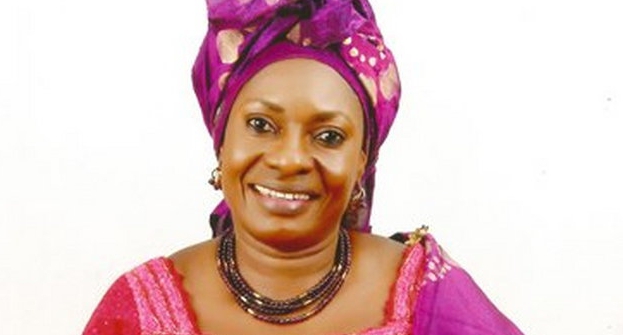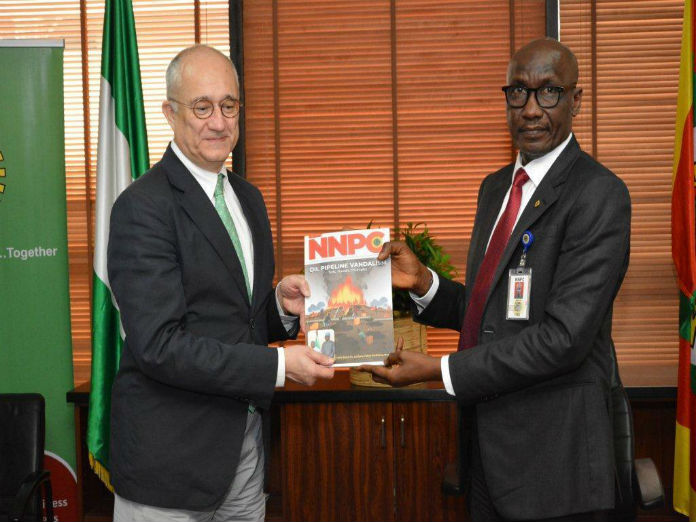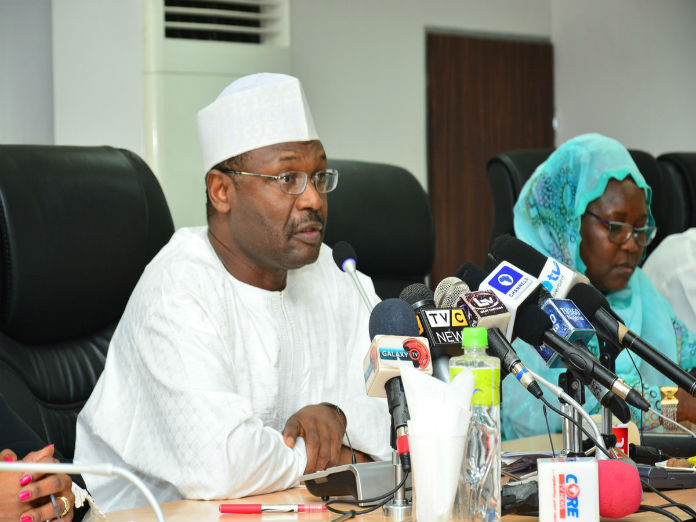The Girl-Child represents the continuation of the cycle of life- Dame Tallen …. Laments the increase in rape cases.
Oru Leonard
Minister of Women Affairs in Nigeria, Dame Pauline Tallen has emphasised that the Girl-Child represents the continuation of the cycle of life, of which without her, life is extinct.
The Minister said in her keynote address during a media briefing and launch of the campaign to support Girl- Child education , to flag of activities for the 2021 Intertional Day of the Girl- Child at the National Centre for Women Development, Abuja yesterday.
“As women gathered in this room we were once Girls, as men in this room, you were given life by a Girl-Child represented by your Mothers. And so, with great pleasure and in solidarity with the Nigerian Girl-Child”, she stated
She noted that “the United Nations in 2011 declared 11th October as a day of observance in honour of the Girl-Child to provide a platform for girls to amplify their voices and stand up for their rights. It acknowledges the importance and potential of the Girl-Child, while enabling more opportunities for girls to attain their full potentials. But the Day was first celebrated globally as an Annual event in 2012. In Nigeria, the International Day of the Girl-Child was first celebrated in 2014 by the Federal Ministry of Women Affairs, National Centre for Women Development in collaboration with the Office of the First Lady.”
She noted further that the 2021 theme “Digital Generation, Our Generation,” speaks to the need to amplify digital revolution and the opportunities it provides for girls to pave paths to freedom of expression, learning opportunities, joy and boundless potential, including the elimination gender-based violence and discrimination. She expressed confidence that with all the activities mapped out by various partners around this year’s Commemoration, the next generation of girls will be inspired to explore positively the exciting world of technology, as a most powerful tools available for empowering girls.
“Information, Communication Technology (ICT) is a vital part of products, services, professions and society, made more relevant with the outbreak of COVID-19 pandemic, where the world has gradually become digitally connected. If Girls must have a role in developing the future, a background in technology is an excellent place to start and that motivation starts today.
“Recognizing that COVID-19 Pandemic has accelerated digital platforms for learning, earning and connecting people. According to a Report published by Joseph Johnson, an Research expert in Cybercrime and online services, number of active internet users worldwide as of January 2021 was put at 4.66 billion active – 59.5 percent of the global population. Of this total, 92.6 percent (4.32 billion) were said to have accessed the internet via mobile devices. According to UNICEF about 2.2 billion people below the age of 25 still do not have internet access at home and Girls are more likely to be cut off, while observing that the gender gap for global internet users grew from 11% in 2013 to 17% in 2019, in the world’s least developed countries.
These inequality and exclusion can only be addressed by deliberately creating wider spaces for the girl-child to receive quality education and access the information superhighway. We must therefore embark on a paradigm shift in scientific orientation, which must be able to continually adapt to changes in knowledge, technology and addressing societal challenges.
Education is a fundamental Right of every child, boy or girl as articulated in the National Policy on Education. This means that progress in girls enrolment, retention and completion will have to be twice as rapid as it is now, if we must realize the Sustainable Development Agenda 2030 for inclusive and equitable quality education”, she stated.
She urged stakeholders to all resolve to make a difference in the lives of a girl-child in their communities by supporting a girl-child to go to school, as progress in girls enrolment, retention and completion will have to be twice as rapid as it is now, if Nigeria is to realize the Sustainable Development Agenda 2030 for inclusive and equitable quality education.
Dame Tallen lamented that the surge in the number of rape cases recorded across the country is alarming. “We have had increase in the number of reported cases of child molestation, (especially girls) in schools by care givers, sex for marks (even at the primary school levels), rape of young girls on the way to school, poor water, hygiene and sanitation conditions, which keep girls out of school during their menstrual cycles, early marriages, cultism, drug abuse, ignorance on the part of parents, hidden charges on the cost of education, even when education is said to be free, kidnapping for ransom, targeting girls as weapons of war, general insecurity, poor quality of teachers, poor infrastructure, etc,”
On what the ministry has done so far to improve the Girl- Child in Nigeria she said,”As a Ministry working with relevant Government Agencies and Development Partners, we have carried out the following programmes:
i. Launched the campaign and call to action to support Girl Child Education;
ii. Put in place ICT programme for the girl child;
iii. Campaigned against the drop out of pregnant young girls from schools;
iv. Created Girl Child Development Division in the Ministry;
v. Established a pad bank in the Ministry;
vi. Proposed the setting up of Girl Child Parliament;
vii. Conduct Advocacy visit to various States to solicit for the support of Governors, Governor’s Wives, State Legislators, Traditional Leaders, Religious Leaders etc to push for the domestication of the Child’s Rights Act 2003 and VAPP Act 2015.
viii. Organized zonal sensitization seminars for 18 States of the Federation on the provisions of the Child Rights Act, 2003, Ending Violence Against Children (VAC) and promoting Girl-Child Education to create continuous awareness among various stakeholders across the Federation;
ix. Flagged off the distribution of Educational materials and Menstrual Hygiene Kits to students at Government Science Secondary School, Garki which marked the 2020 International Day of the Girl Child on 11th October, 2020;
x. Interactive forum was also organized between school children and the Honourable Minister that marked part of the activities of the 2020 year of activism to end Gender Based Violence in Nigeria, where school materials, sanitary items were distributed to over 3000 girls, including bicycles to 6 schools;
xi. In collaboration with UNICEF, supported by Global Partners to End Violence Against Children are working on the development of the National and State Action Plan on Ending Violence Against Children;
xii. Distributed educational materials as well as sanitary items during the Universal Day of the Child on 20th November, 2020 at Government Science Technical College, Maitama, Abuja, equally Commemorated the 2021 International Day of Women and Girls in Science at Government Girls Science Secondary School Kuje, Abuja on 11th February, 2021 and Commemorated the 2021 International Day for Girls in ICT at Government Girls Secondary School Dutse, Abuja on the 22nd April, 2021.
xiii. With support from UNICEF organized the National Policy Dialogue on Ending Violence Against Children, where the His Excellency, President Muhammadu Buhari GCFR, represented by the Vice President, Federal Republic of Nigeria signed a 7 – Points Commitment to End Violence Against Children in Nigeria;
xiv. Working in collaboration with the Federal Ministry of Education to implement the Adolescent Girls Initiative for Learning and Empowerment (AGILE) Project aimed at supporting the expansion of secondary education opportunities among girls while empowering young women by increasing their human capital and economic opportunities in targeted States namely: Borno, Ekiti, Kaduna, Kano, Katsina, Kebbi and Plateau, with a financing amount of USD 500 million, which is distributed across multiple interventions that will directly benefit about 15.5 million beneficiaries; among others.
The Minister thanked the Media for always spotlighting the efforts of the Federal Government of Nigeria in addressing issues and concerns of Child Survival, Development, Protection and Participation, including those affecting the Girl-Child.




